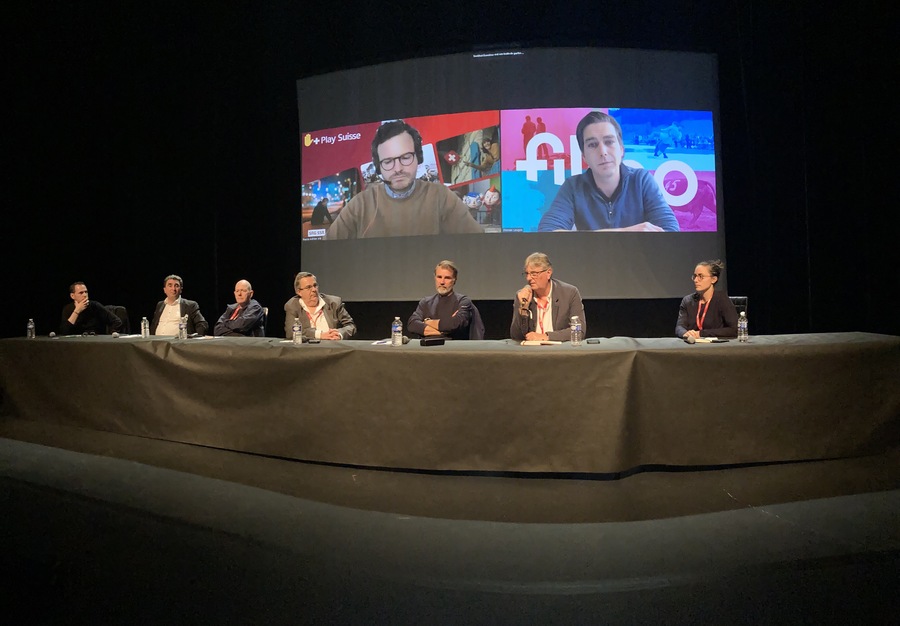Focus on guest country: Switzerland, a plural and dynamic heritage sector
At the beginning of the afternoon of this second day, the MIFC organized a round table around the guest country, Switzerland, on the plurality and dynamism of its heritage.

Around Stéphane Gobbo, Head of Culture + Le Temps Week-end, were gathered Florian Leupin, Project Manager at Filmo, Pierre-Adrian Irlé, Project Manager at SRG SSR, Marcel Müller, Consultant Film, Programs & VOD at Swiss films, Félix Hächler, general manager of Filmcoopi, Alfio Di Guardo, deputy director of the Cinéma du Grütli, Gérard Ruey, president of the Alain Tanner association, Frédéric Maire, director of the Cinémathèque Suisse and Daria Voumard, Locarno Pro Industry manager at the Locarno Film Festival.
Frédéric Maire began the roundtable by addressing the particularities of the Swiss film heritage. According to him, to quote the Swiss artist Ben, "Swiss cinema does not exist". A joke to explain the particularity of an industry subject to the situation of the country, where the 26 cantons that compose it are divided into four languages: French (French-speaking Switzerland), Italian (Italian-speaking Switzerland), German (German-speaking Switzerland) and Romansh. It is also a little-known and little-identified cinema, with the exception of a few figures such as Alain Tanner or Michel Soutter, with a relatively random distribution, very much oriented towards European co-productions. The director of the Cinémathèque Suisse points out that the mission of the latter is to preserve this Swiss heritage, but also to digitize and restore it, but not only. In fact, it has one of the largest collections in the world, which allows it to collaborate with many foreign countries, giving as an example, the leading role of the Cinematheque in the recent restoration of La Roue by Abel Gance.
Despite the late interest of the Confederation for its cinematographic heritage, many initiatives have emerged, and continue to emerge, to develop the knowledge and dissemination of this rich and diversified heritage. The Locarno Film Festival, for example, has taken advantage of the 1st confinement to set up its Heritage Online platform (to which MIFC accredited persons have free access for 1 year) to facilitate the distribution of heritage films, especially on VoD media. Click here to learn more. Two Swiss platforms were also present. The first one, Play Suisse, a streaming platform created by the SSR (Swiss Broadcasting Corporation) aims to bring together the co-productions and productions of the SSR free of charge, beyond any language barrier since each series, documentary or other is translated to be accessible beyond its Swiss region of origin. For its part, Filmo, an initiative of the Solothurn Film Festival, made possible by the Migros Pioneer Fund, presents Swiss cinema through the recommendations of independent experts. The selected films are published under the Filmo label on established Swiss streaming providers, in three national languages and in the best possible quality.
On the cinema side, distributor Felix Hächler and exhibitor Alfio Di Guardo, deputy director of the Cinéma du Grütli, which has two screening rooms in Geneva, make heritage films, both Swiss and foreign, a specialty. And according to their experience, this one is very popular in Switzerland, Alfio Di Guardo explaining in particular that his cycle « Italian comedies » during the reopening, after the second confinement, had done very good scores. But both of them also confirm that Swiss cinema has a lot of trouble to make a place for itself among moviegoers, as it is regularly mistaken for the cinema of countries that co-produce it. For the speakers, the real concern is the lack of political interest in this cinema, which is also part of Switzerland's rich and complex identity. This was explained in particular by Gérard Ruey, president of the Alain Tanner Association, who had to set up, himself, this organization, financed by private and public actors, to digitize and preserve the works of the director of The Salamander, who is one of the Swiss filmmakers most in demand abroad.
Everyone agreed that although Swiss cinema is well subsidized, it is still quite confidential, as Switzerland still has some difficulties to open up to the outside world, according to Frédéric Maire. He adds that cultural lobbying, to support the cinematographic heritage, is still a bit difficult to make itself heard in a country that only works on the basis of consensus, even if for the last two years, a support for the digitization of the Swiss cinematographic heritage has appeared. But as Marcel Müller, Film, Programs & VOD Consultant at Swiss films, sums up, "it is important to support new Swiss works today because they will be the heritage of tomorrow ».




